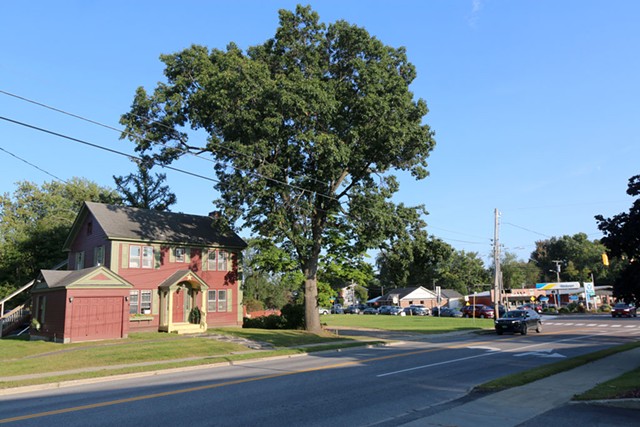
- Kevin Mccallum ©️ Seven Days
- The disputed vacant lot on the corner of Williston and Patchen roads in South Burlington
Bridget Gracey had been trying for years to sell a small corner lot on Williston Road in South Burlington where her grandparents once lived, across the street from businesses started by her family: Gracey's Store & Deli and Gracey's Liquor Outlet.
This summer, a buyer finally stepped forward. A housing developer from Winooski agreed to purchase the long-vacant half-acre parcel for $430,000, with plans to build up to 32 units of housing.
Her hopes for a quick payout were dashed, however, when the project ran into two hurdles. The first was a decades-old deed restriction preventing most kinds of businesses from operating on the site. The second was the owner of an adjacent office building, Hinsdale Properties, who wanted something in exchange for lifting the restriction— $500,000.
The demand blindsided Gracey, who has been a real estate agent for decades and had never run into anything like it.
"South Burlington needs new housing, and these guys want to build it," said Pete Bissonnette, Gracey's fiancé and a partner in the potential deal. "To be held hostage and not be able to put up what you want there is asinine."
The demand was made by Jacob Hinsdale, property manager for Hinsdale Properties, the company his father, Clark, founded in the 1950s. It controls one of the largest real estate empires in the area.
Jacob is married to state Sen. Kesha Ram Hinsdale (D/P-Chittenden-Southeast), who's been an advocate for removing barriers that prevent new housing. Earlier this year, the Vermont Senate Ethics Committee dismissed a complaint from several citizens that alleged a conflict of interest between the family business she married into and her duties leading a legislative housing committee — a complaint that Ram Hinsdale said at the time was "completely baseless." Reached on Monday, she declined to comment.
Vermont has a long history of restrictive zoning practices that limit multifamily housing, often with the justification of preserving the character of a community. It's something land-use planners, economic development officials and politicians largely agree has contributed to the state's housing crunch.
But even in places such as South Burlington, which has welcomed high-density residential projects in its new downtown, historic opposition to development can remain deeply rooted in land records and be harder to sweep aside. Decades-old deed restrictions, known as covenants, are just one example.
"It's a dispute that rears its head long after the people who made the provision are long gone," said Yves Bradley, a commercial real estate broker who is familiar with the contested property but not involved. "It's the kind of thing that can really come back and bite you in the ass."
In most cases, a deal is still possible when property owners agree to work together, he said. When informed the Hinsdale family was demanding $500,000 to lift the restriction, Bradley burst out laughing.
"And we wonder why nothing gets built in Vermont," he said.
The site at the busy intersection of Williston and Patchen roads is across the street from two gas stations and kitty-corner to a bank.
It is located in a zone that used to allow up to six units of housing. In 2016, the city adopted form-based code, which sets no limit on the number of housing units allowed but caps buildings at five stories tall.
A preliminary site assessment found that the modest parcel could contain a three-story building with up to 32 studio apartments plus commercial space on the first floor, according to Nathan Dagesse, the potential purchaser. Dagesse, whose company has helped build a number of the modern multistory, mixed-use apartment buildings in Winooski in recent years, felt the location was suitable for a similar building.
That is, until he found the land records on file with the city, which contain a handwritten document that limits what can be built on the property.
"I'm pretty sure that when we dug it up, not anyone in town that's alive knew anything about it," Dagesse said.
The restriction dates to 1940, when Alexander Terrien and his wife, Mattie, subdivided a property at the intersection of Williston and Patchen roads.
The couple sold a home on the northeast corner to William and Gladys Neudewitz, but with some significant strings attached. Terrien wanted to make sure the use of the corner lot did not negatively affect three other separate lots he created. The document, written in a meticulous cursive hand, states that henceforth, the corner lot "shall not at any time be used for the purpose of any trade, manufacture, or business of any description" and "particularly shall not be used as a public garage or filling station" or related uses. It forbids "preventing the obstruction of view, light and air from said lots."
One kind of business that would be allowed: a grocer. In a quirky Vermont twist, the deed states that "the sale of maple syrup, maple sugar, and other maple products may be conducted on said premises."
The conditions on the corner lot were intended to "run with the land" for the benefit of the owners of the three lots "and to all subsequent owners of said lots." Hinsdale Properties owns the three lots, which, at some point, were combined into one. A red colonial-style home sits there now and is occupied by various businesses, including hair and nail salons.
Bridget Gracey's grandparents ended up living in the home on the corner, which later burned down; she and her brothers inherited the vacant land several years ago.
Dagesse originally interpreted the prohibition on the corner lot as merely blocking commercial uses, which he said was unfortunate. Businesses can add vibrancy to the ground floors of apartment buildings and surrounding buildings, as well. Hinsdale Properties took the position, however, that apartments, too, were a form of business and therefore restricted under the covenant.
In addition to the $500,000 demand to remove the restriction, the Hinsdales proposed height restrictions and setbacks from their property, any one of which could effectively kill the deal, Dagesse said.
"It's very difficult to develop right now, so you throw any additional little challenge on these sites and you're going to stall out," he said.
After Seven Days reached out to Jacob Hinsdale last week, the company countered with a "significantly lower" financial demand, Dagesse said on Monday. Negotiations are continuing, and he's hopeful an agreement can be struck to salvage the deal. Bissonnette said they've hired an attorney and are exploring getting the covenant invalidated if negotiations falter.
Reached for comment, Jacob Hinsdale said he was on paternity leave and declined to answer questions.
South Burlington has been working hard in recent years to develop housing as part of its nearby City Center project, a dense thicket of apartments and businesses by the Dorset Street commercial corridor that is meant to create a vibrant, walkable, bikeable town center. The state has incentivized the effort with grants and more flexible zoning, explained Paul Conner, the city's planning and zoning director.
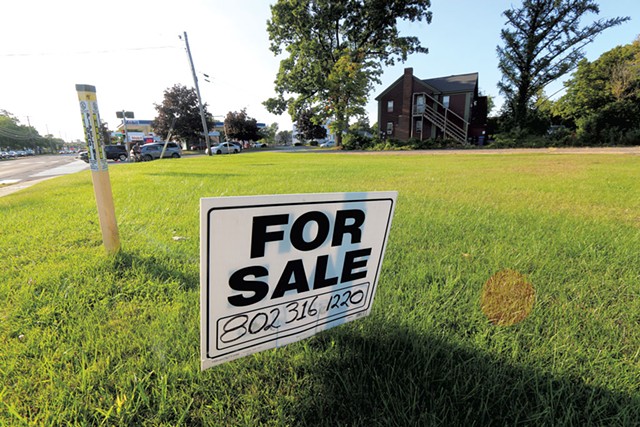
- Kevin Mccallum ©️ Seven Days
- The disputed vacant lot on the corner of Williston and Patchen roads in South Burlington
The city would welcome development on the Williston Road lot but is neutral on what kinds of uses the building should contain, Conner said.
Bissonnette, a commercial builder, got involved in the property as a silent partner when one of Gracey's brothers offered to be bought out. Bissonnette and Gracey now split their time between Vermont and a gated community near St. Augustine, Fla. He has no connection to Bissonette Properties, one of Burlington's largest landlords, and his name is spelled differently.
The original demand exceeded the value of the sale, preventing any deal from moving forward. That's too bad, Bissonnette said, because an apartment building there could bring more customers to businesses in the Hinsdale property.
"I don't see where it's hurting him to have a building there," he said.
Bradley, the commercial real estate broker, said he understands why a neighboring property owner might have a range of questions about a proposed development. They might withhold support until those questions — about features and traffic flow, for instance — are answered, he said.
"It's a tiny site, and if they are talking about going vertical, that will be jarring," Bradley said.
It's also possible that there is some personal history at play, said Greg Chioffi, who owns and rents out a home east of the vacant lot. Several years ago, a commercial developer expressed interest in buying the Gracey property and the Hinsdales' to combine them, Chioffi said. But, he added, the deal never came together, in part because Bridget Gracey believed the property was more valuable than it was.
"She once said, 'My father told me this was a million-dollar corner,'" Chioffi recalled.
It might make more sense for all three properties, including Chioffi's, to be developed together so a larger project could proceed, Chioffi said. That would require a degree of cooperation that, at the moment anyway, seems in short supply.
"I don't begrudge him asking for the money," Chioffi said of Hinsdale. "And I don't begrudge the Graceys for being a little pissed about it."







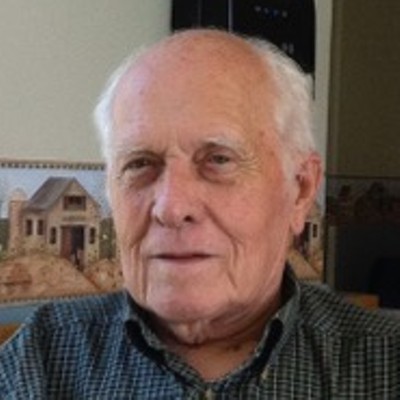
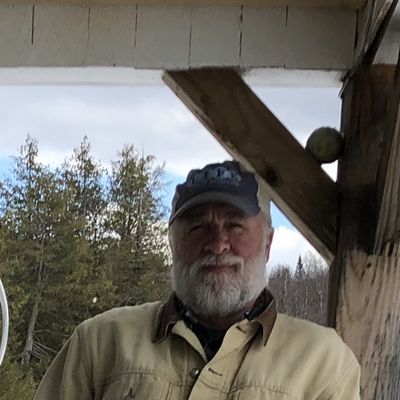
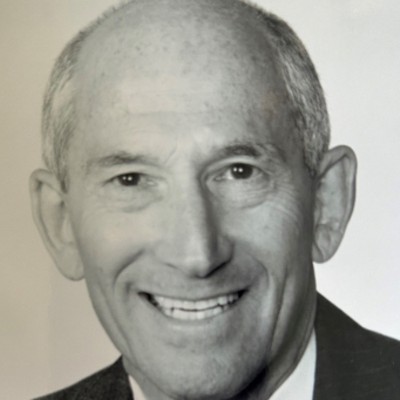

Comments
Comments are closed.
From 2014-2020, Seven Days allowed readers to comment on all stories posted on our website. While we've appreciated the suggestions and insights, right now Seven Days is prioritizing our core mission — producing high-quality, responsible local journalism — over moderating online debates between readers.
To criticize, correct or praise our reporting, please send us a letter to the editor or send us a tip. We’ll check it out and report the results.
Online comments may return when we have better tech tools for managing them. Thanks for reading.